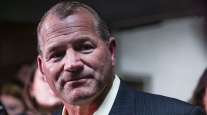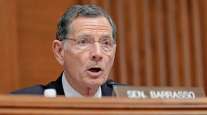Senior Reporter
New Congressional Infrastructure Caucus Promotes Access, Resilience

[Stay on top of transportation news: Get TTNews in your inbox.]
WASHINGTON — Congestion relief, climate resilience and transit accessibility are among the policies a small group of U.S. House lawmakers are promoting as Congress readies a comprehensive highway bill.
The newly formed Future of Transportation Caucus is focused on advancing a new vision to modernize the country’s transportation landscape that is anchored on ensuring access for users on freight and passenger corridors.
Launching the #FutureofTransportation Caucus with @RepPressley and @RepMarkTakano to create a new vision for our transportation systems that emphasizes equity, accessibility, and sustainability. pic.twitter.com/GSYyJtMBua
— Congressman Chuy García (@RepChuyGarcia) October 17, 2019
Priority will be given to equity, access and sustainability across modes of transportation rather than advocating exclusively for additional funding, caucus leaders explained Oct. 17.
“It’s time we jump-start this conversation about fundamentally rethinking our transportation policy and objectives,” said Rep. Chuy Garcia (D-Ill.), a member of the Transportation and Infrastructure Committee and caucus co-chairman. He shares chair duties on the caucus — which has attracted nearly two dozen members — with Reps. Ayanna Pressley (D-Mass.) and Mark Takano (D-Calif.) .
“Our policies and investments must intentionally prioritize mass transit systems, protect frontline communities and alleviate the environmental health hazards caused by traffic congestion every day,” said Pressley, who also sits on the House Financial Services Committee.
The group’s aim is to present policy recommendations to transportation leaders during the crafting of the legislation that will update the 2015 FAST Act highway law. The House transportation committee intends to take up the reauthorization bill early next year. The objective is to clear the bill for the president’s desk prior to the FAST Act’s expiration in the fall of 2020.
While transportation policymakers are largely in agreement on the need to proceed with a comprehensive update of infrastructure policies, they continue to disagree on matters pertaining to funding. Few lawmakers advocate for raising federal fuel taxes as a way to boost a highway account used to assist states with projects. Instead, most members of Congress advocate for adopting other sources of funding.

Rep. Earl Blumenauer by Steve Dykes/AP
Rep. Earl Blumenauer (D-Ore.), a member of the tax-writing Ways and Means panel, endorses a fuel tax increase. He extended his support for the Future of Transportation Caucus on Oct. 17.
“It’s not just about money, which is important,” he said. “It’s about the connections. It’s about inclusivity. And this is coming at a time when we are trying to tie communities together,” Blumenauer said.
In recent years, policymakers have offered legislation designed to promote inclusivity across the transportation landscape. The “complete streets” concept calls for accommodating commercial vehicles, pedestrians, cyclists, drivers, buses and transit along the same system.
Lawmakers also have sought to advance climate resilience provisions in various measures. Most recently, a Senate surface transportation panel reported a five-year, $287 billion highway reauthorization this summer that included provisions meant to ensure corridors are rebuilt with the capability of withstanding the impact of severe weather events.
In the House, transportation panel Chairman Peter DeFazio (D-Ore.) recently indicated his reauthorization version will include climate resilience proposals. He said in an interview with Transport Topics he plans to transition away from the Eisenhower-era concept of highways and take the country on a new approach that embraces technological advancements.
The advocacy group Transportation for America endorsed the caucus. The group detailed guiding principles for investment, which included prioritizing maintenance, designing corridors for safety instead of speed, and connecting individuals to employment opportunities and communities.
As the group put it, “Since the dawn of the modern highway era, we have used vehicle speed as a poor proxy for access to jobs and important services like health care, education, public services and grocery stores. The way we build roads and design communities to achieve high vehicle speed often requires longer trips and makes shorter walking or bicycling trips unsafe, unpleasant or impossible.”
Want more news? Listen to today's daily briefing:




